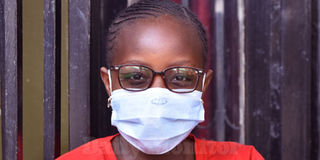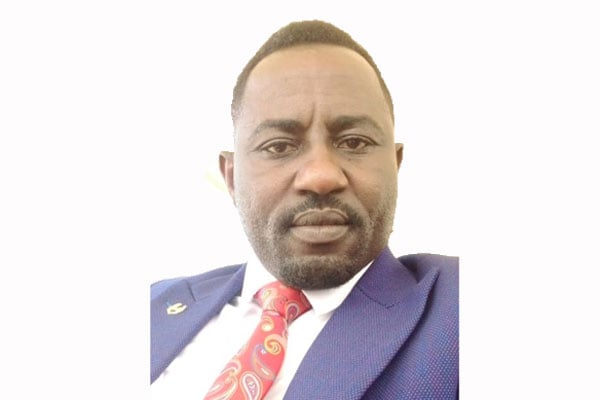Beating Covid: 12-year-old’s battle with virus

In the series dubbed ‘Beating Covid,’ we trace victims who caught the virus and overcame it. Promise Twinamukye brings the story of Stacey Wanjiru Githinji, 12, who struggled to come to terms with the fact that she could contract the virus at her age.
Stacey Wanjiru Githinji, a 12-year-old girl, was scared out of her wits when she tested positive for Covid-19 during voluntary testing.
It was two weeks into her school holiday when Wanjiru started experiencing a sore throat, flu and headache, which she thought she got due to inhaling a lot of dust.
However, when she got a fever around 2am, she was taken to International Hospital Kampala (IHK) the following day. There, she was treated for a sore throat infection, which her mother Florence Wamuyu Githinji thought was due to the ice cream she had had before and her history of sore throat problems.
While on medication, however, Wanjiru developed a cough, which made her mother suspicious. On Friday that week, she suggested they go for a voluntary Covid-19 test. At IHK, her result turned positive.
“My mind went blank, my heart skipped a beat. I was scared and shocked. My whole body turned cold in an instant. I could not even believe I could be Covid-19 positive,” Wanjiru recalls.
She reveals that she knew a little about Covid-19 and the stigma it brings. She had known this from reading about it on the Internet and from watching the news on TV, but she did not believe it could happen to her.
“My mother, her friend and my doctor calmed me down because I was afraid. By the time I returned home from testing, I had accepted that I had Covid-19, and had started working on my recovery journey with my mother and nanny,” she says.
Ms Wamuyu says the results were just a confirmation of what she was suspecting, so she was ready for what was coming.
“Because of the signs and symptoms she had, I was kind of prepared for anything. But the fear I saw in her eyes was heartbreaking,” she says.
After getting Wanjiru’s results, Ms Wamuyu decided to test along with the nanny but they found out that they did not have the virus.
Ms Wamuyu quickly contacted her daughter’s doctor who told them the necessary procedures to follow and which medicines to buy.
“The doctor advised us to get an antibiotic, an anti-inflammatory, and vitamins D and C and Zinc. I had to be a medic and a parent to be able to observe social distancing and also treat my child,” she says.
Apart from buying medication for Wanjiru, Ms Wamuyu also bought preventive medication for herself and the nanny. Because it was close to two weeks after Wanjiru had left school for the holidays that she started manifesting the symptoms, Ms Wamuyu concluded it was not from school.
“We suspected she might have got it from the social interactions she had when she went swimming. There, she did not mask up as much as she did when at home,” Ms Wamuyu says.
Starting the healing journey
“The first thing I did when I got home was to label my isolation room, which was my bedroom, and plan on different activities I would do to quicken my recovery,” Wanjiru shares.
“I basked in the sun every morning for the Vitamin D. I read a novel called Oliver Twist and the Bible. I prayed a lot too. I took brief evening walks with my mother, and skipped the rope. I also sanitised all the time,” she added.
On top of that, young Wanjiru also made rules that would guide her through her recovery journey, the main one being tonsemberera (loosely translated as do not come close to me). These included taking her medication on time, having a good diet with lots of fruits, fresh juice and a jug of water on a daily basis, wearing a face mask and sometimes double mask, especially when with other people in the sitting room.
Others are sanitising and washing hands, sterilising utensils with hot water, checking her temperature and oxygen levels regularly, steaming with majorly eucalyptus and menthol, social distancing, praying, keeping warm and avoiding cold eats or drinks and revising her books in the second week.
Difficult moments
“I remember one day on an evening walk with my nanny, I had difficulty in breathing and had to go back home. I had difficulty catching my breath and felt like I would die,” she says.
Wanjiru also says when she would steam, she would get an intense cough she feared the neighbours would hear and suspect she has the virus.
“I was also scared because I did not know the effects of steaming but my mother told me to calm down,” she says.
The reality that she had to keep distance from her daughter was not easy for Ms Wamuyu. But she had to do so, so as not to spread the virus.
“I would wake up and ask her what new symptom she felt. I was always worried about the symptoms that would arise anytime,” she says.
Ms Wamuyu recalls feeling terrible when she realised Wanjiru had lost her sense of smell. She had put onions around Wanjiru’s room to absorb toxins. Wanjiru then asked the mother what she had put on her bed. It hit Ms Wamuyu at that point that her daughter was not able to smell them.
Getting through the 14 days
Ms Wamuyu feels that prayer kept them closer and helped in the quick recovery. She also is grateful to the doctor who always kept in touch online, and the synergy of the different medications they used.
“After 14 days, we contacted her doctor online and went through all the checkups needed such as the sense of taste, and oxygen levels which I did since I am a medic myself,” Ms Wamuyu says.
They were advised to keep Wanjiru in isolation for another seven days before she could be declared Covid-19 free.
Wanjiru’s words of advice to children are to keep safe by wearing a mask all the time even when playing, and to remember to sanitise and wash their hands.
“In case you are diagnosed Covid-19 positive, do accept the results and work on the recovery journey with the person looking after you, ensuring that you all observe SOPs. Also, all teachers and parents should support their children to avoid them being socially stigmatised,” she concludes.
What experts say
Whereas much of the focus now is on vaccination to get out of the Covid-19 pandemic, those aged below 18 years have not had the chance to get vaccinated. Unlike other vaccines such as measles and polio that are usually given at younger age, parents have questioned why their children are not being allowed to get the Covid jabs.
Dr Misaki Wayengera, the head of the Ministerial Scientific Advisery Committee on Covid-19, said as per the World Health Organisation (WHO) guidelines, the studies on vaccines have been done for those above 18 years.
“We have seen countries beginning to vaccinate those under 18 starting from 12 years upwards. Children get Covid much as its not severe. Some children get what we call multi system inflammatory syndrome, which is a kind of auto immune reaction. To avoid this certainly, we need to think of bringing down the vaccination age. The problem though has been logistics,” he added.
Dr Richard Idro, the president of Uganda Medical Association, said Covid-19 vaccines should be given to those who are 18 years and older.
Common symptoms of covid
According to Ministry of Health, the commonest symptoms of Covid-19 range from fever, dry cough, tiredness to flu, aches and pains, sore throat, headache, loss of taste or smell, difficulty in breathing or shortness of breath and chest pain.




